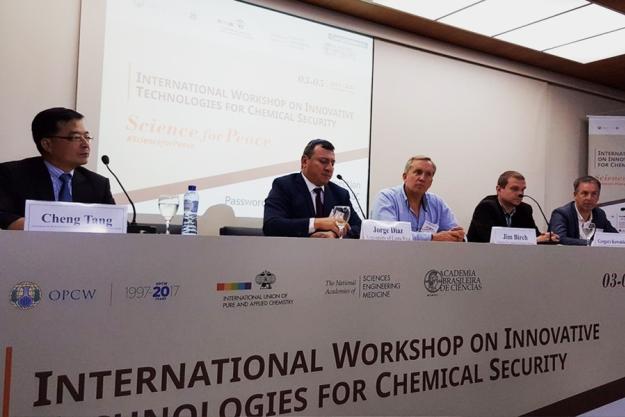
Participants at a workshop on innovative technologies for chemical security in Rio de Janeiro
THE HAGUE, Netherlands — 7 July 2017 — The Scientific Advisory Board (SAB) of the Organisation for the Prohibition of Chemical Weapons (OPCW) discussed the potential uses innovative scientific and technological tools in the implementation of the Chemical Weapons Convention (CWC) at a workshop “Innovative Technologies for Chemical Security”, held from 3 to 5 July in Rio de Janeiro, Brazil.
The event was organised in cooperation with the International Union of Pure and Applied Chemistry (IUPAC), the National Academies of Science, Engineering and Medicine of the United States of America (NAS), the Brazilian Academy of Sciences and the Brazilian Chemical Society.
“This workshop brought together an international transdisciplinary group of experts whose work involves integrating remote sensing technologies, autonomous systems, and/or mobile devices with data analytics into enabling technologies, many of which could find application in the implementation of the Convention,” explained SAB Chairperson, Dr Christopher Timperley.
The attendees presented their work in areas that included remote sensing of biochemical change in vegetation, satellite imagery analysis, mobile and wearable sensing technologies, digital health, and automated systems for data collection in dangerous environments.
They also heard from OPCW experts, who discussed their experiences in chemical weapons related investigations, including those in the Syrian Arab Republic. OPCW Science Policy Advisor and Secretary to the SAB, Dr Jonathan Forman explained: “New advances across the chemical and biological sciences are increasingly enabled by ideas and tools from sectors outside these disciplines, with information and communication technologies playing a key role across 21st century scientific development. In the face of such rapid advances, we look for technological opportunities that strengthen our capabilities in the field of chemical disarmament.”
The workshop discussions provided useful insights into the use of innovative new technological tools for the implementation of the CWC that will inform the SAB’s report on developments in science and technology for the Fourth Review Conference of the CWC in December 2018.
The workshop, held at the Brazilian Academy of Sciences, was attended by 45 scientists and engineers from 22 countries, and enabled through generous support from IUPAC, the NAS and the European Union.
Background
The SAB consists of twenty-five independent experts from the OPCW Member States. It advises the OPCW Director-General on science and technology issues relevant to the implementation of the CWC, including investigations of alleged use.
As the implementing body for the Chemical Weapons Convention, the OPCW oversees the global endeavour to permanently eliminate chemical weapons. Since the Convention’s entry into force in 1997 – with its 192 States Parties – it is the most successful disarmament treaty eliminating an entire class of weapons of mass destruction.
Ninety-five per cent of all chemical weapon stockpiles declared by possessor States have been destroyed under OPCW verification. For its extensive efforts in eliminating chemical weapons, the OPCW received the 2013 Nobel Prize for Peace.
